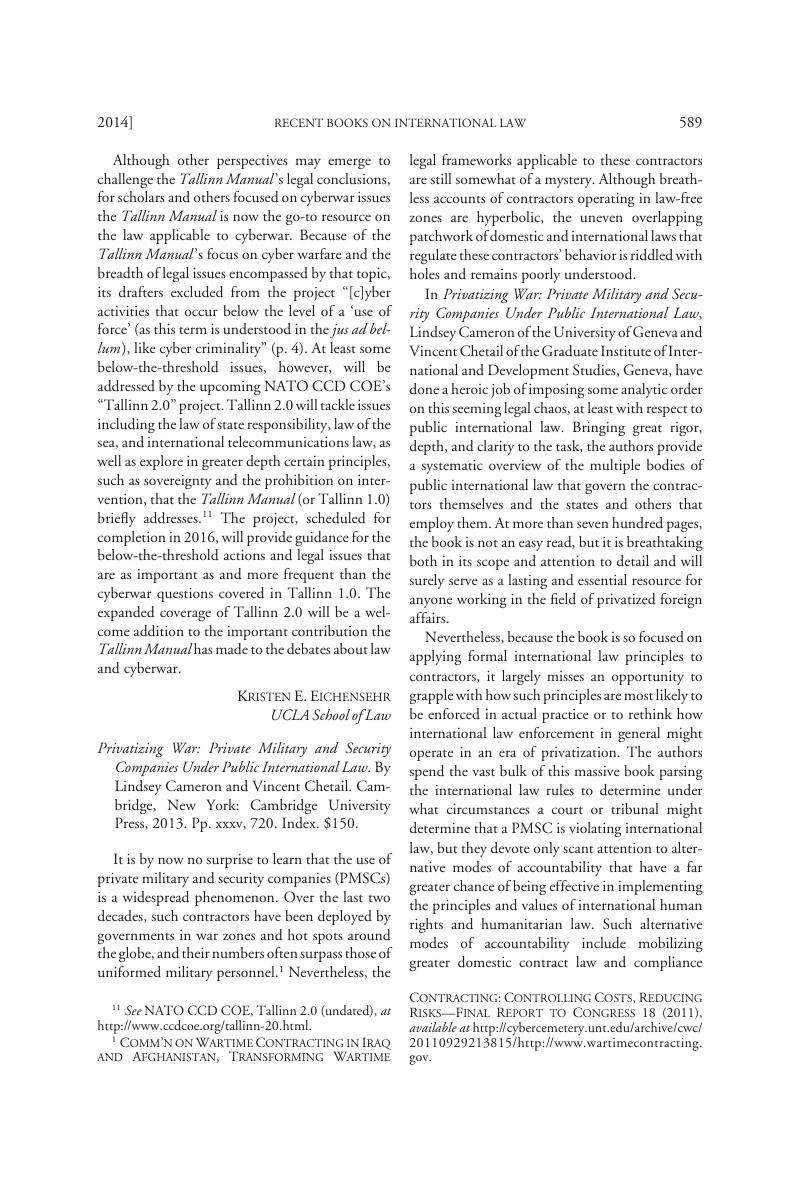No CrossRef data available.
Article contents
Privatizing War: Private Military and Security Companies Under Public International Law. By Lindsey Cameron and Vincent Chetail. Cambridge, New York: Cambridge University Press, 2013. Pp. xxxv, 720. Index. $150.
Published online by Cambridge University Press: 20 January 2017
Abstract

- Type
- Recent Books on International Law
- Information
- Copyright
- Copyright © American Society of International Law 2014
References
1 Comm’n on Wartime Contracting in Iraq and Afghanistan, Transforming Wartime Contracting:Controlling Costs, Reducing Risks—Final Report to Congress 18 (2011), available at http://cybercemetery.unt.edu/archive/cwc/20110929213815/http://www.wartimecontracting. gov.
2 For a summary of the law of mercenaries, see Dickinson, Laura A., Mercenarism and Private Military Contractors, in 1 International Criminal Law: Sources, Subjects, and Contents 355 (Bassiouni, M. Cherif ed., 3d ed. 2008).Google Scholar
3 Draft Articles on Responsibility of States for Internationally Wrongful Acts, Art. 4, in Report of the International Law Commission on the Work of Its Fifty-Third Session, 44, UN GAOR, 56th Sess. Supp. No. 10, UN Doc. A/56/10 (2001) [hereinafter ILC Draft Articles].
4 Military and Paramilitary Activities in and Against Nicaragua(Nicar.v.U.S.), 1986 ICJ Rep.14(June 27); Stephens v. United Mexican States (U.S. v. Mex.), 4 R. Int’l Arb. Awards 265 (1927); Trial of Josef Kramer and 44 Others, 2 UN War Crimes Comm’n 152 (Brit. Mil. Ct. 1945) (Stephens case); Public Prosecutor v. Menten, NJ79(Neth.S.Ct. 1981),translated in 75 ILR 331.
5 Anthony R. Jones & George R. Fay, Dep’t of the Army, AR 15-6 Investigation of the Abughraib Detention Facility and 205th Military Intelligence Brigade 15 (2004), available at http://www.dod.gov/news/Aug2004/d20040825fay.pdf.
6 ILC Draft Articles, supra note 3, Art. 5.
7 This doctrine attempts to delineate the sorts of functions that the U.S. government may or may not outsource based on the idea that certain functions are inherently governmental and should not be delegated. See, e.g., Office of Federal Procurement Policy, Policy Letter 11-01: Performance of Inherently Governmental and Critical Functions, 76 Fed. Reg. 56,227 (Sept. 12, 2011), available at http://www.gpo.gov/fdsys/pkg/FR-2011-09-12/pdf/2011-23165.pdf.
8 see Swiss Fed. Dep’t of Foreign Aff. & Int’l Comm. of the Red Cross, Montreux Document on Pertinent International Legal Obligations and Good Practices for States Related to Operations of Private Military and Security Companies During Armed Conflict (2009), available at http://www.eda.admin.ch/etc/medialib/downloads/edazen/topics/intla/humlaw.Par.0078.File.tmp/Montreux%20Broschuere.pdf.
9 Int’l Comm. of the Red Cross, Interpretive Guidance on the Notion of Direct Participation in Hostilities Under International Humanitarian Law 996, para. V(3) (Nils Melzer ed., 2009), available at http://www.icrc.org/Web/Eng/siteeng0.nsf/htmlall/p0990/$File/ICRC_002_0990.pdf.
10 For an account of such problems, see Sarah Stillman, The Invisible Army, New Yorker, June 6, 2011, at 56, available at http://www.newyorker.com/magazine/2011/06/06/the-invisible-army. See also, e.g., Strengthening Protections Against Trafficking in Persons in Federal Contracts, Exec. Order No. 13,627, 77 Fed. Reg. 60,029 (Sept. 25, 2012), available at http://www.whitehouse.gov/the-press-office/2012/09/25/executive-order-strengthening-protections-against-trafficking-persons-fe (addressing trafficking issues related to contractors).
11 133 S.Ct. 1659 (2013).
12 28 U.S.C. §1350.
13 For example, Cameron and Chetail discuss government contracts in the context of defining the government’s due-diligence obligations rather than examining the efficacy of the contracts and contractual oversight mechanisms. And their analysis of codes of conduct is quite cursory. Indeed, they analyze codes of conduct within the framework of industry self-regulation, even though, as discussed infra, such codes may entail hybrid public/private models of regulation.
14 For discussion of some alternative models, see Laura A. Dickinson: Outsourcing War and Peace:Preserving Public Values in a World of Privatized Foreign Affairs (2011).
15 International Code of Conduct for Private Security Service Providers (2010), available at http://www.icoc-psp.org/uploads/INTERNATIONAL_CODE_OF_CONDUCT_Final_without_Company_Names.pdf. For an evaluation of the Code and its enforcement mechanism, see Dickinson, Laura A., Regulating the Privatized Security Industry: The Promise of Public/Private Governance, 63 Emory L.J. 417 (2013)Google Scholar.
16 International Code of Conduct for Private Security Service Providers’ Ass’n, Articles of Association (2013), at http://www.icoc-psp.org/uploads/ICoC_Articles_of_Association.pdf.
17 see Swiss Fed. Dep’t of Foreign Affairs, Factsheet:International Code of Conduct for Private Security Service Providers 2 (2011), at http://www.icoc-psp.org/uploads/Fact_Sheet_ICoC_November_2011.pdf (noting that the International Code of Conduct process involved private security companies, industry associations, governmen tal representatives, and various humanitarian and non governmental organizations).




